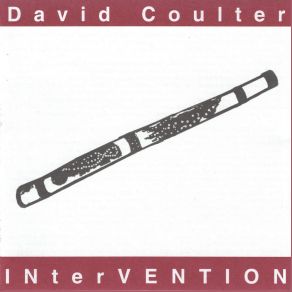InTERvention
Download links and information about InTERvention by David Coulter. This album was released in 2000 and it belongs to Rock, Alternative genres. It contains 13 tracks with total duration of 53:11 minutes.

|
|
|---|---|
| Artist: | David Coulter |
| Release date: | 2000 |
| Genre: | Rock, Alternative |
| Tracks: | 13 |
| Duration: | 53:11 |
| Buy it NOW at: | |
| Buy on iTunes $9.99 | |
Tracks
[Edit]| No. | Title | Length |
|---|---|---|
| 1. | Kinsnow Orchestra | 3:38 |
| 2. | How Can I Love Thee? | 1:29 |
| 3. | Broken Mass | 3:53 |
| 4. | Picnic On... | 2:18 |
| 5. | Harmonik | 5:56 |
| 6. | Shinju (Pot Etude #3) | 3:29 |
| 7. | Widow's Lament | 5:31 |
| 8. | Waiting / Seesaw | 4:25 |
| 9. | Darkness Aside Trail | 3:11 |
| 10. | Slide Krar Story | 5:50 |
| 11. | Looking At Trees | 5:45 |
| 12. | Stagefright | 1:55 |
| 13. | Polaroids (Interventions in 10 parts) | 5:51 |
Details
[Edit]David Coulter is well known among musicians as a sideman of enormous talent on virtually any instrument he chooses to play and can perform in almost any musical setting. (Hint: he was in the Pogues and the industrial power unit Test Dept. at the same time.) His debut solo album on Young God (label boss Michael Gira has a knack for discovering new talent and recording them before anyone else does) is a compendium of Coulter's amassed musical and sonic knowledge. The disc opens with "Kinsnow Orchestra," on which Coulter plays jew's harp, krar, and one-string fiddle, while being accompanied by a sheet-like soundscape by Palix, a double bass, and guitar. There is an Indian raga feel to the piece, but it has no time signature, it's all microtones strung together in rows. On "How Can I Love Thee?" Coulter's soprano saxophone accompanies an over-the-phone reading by Iain Morris of Elizabeth Barrett Browning's poem of the same name. It's darker-than-night feel gives the impression of a suicide note being left on an answering machine. When Coulter writes his short "Broken Mass," one can hear the Kyrie Section of the orthodox liturgy cut short all but one tone and three notes. Coulter does a vocal in the tradition of the Tuvans and Tibetans meeting in the Himalayas while using a plectra violin and a piano for sonic architecture; it doesn't tower above you, it floats through your body, leaving a longing for the sacred with the taste of the profane on your skin. On "Harmonik," where the entire piece is a dance tune created and executed in just intonation with Ghedalia Tazartes on vocal and accordion, the overtones come from the sawing of the violin in its high register, just behind its own drone and the accordion pulsing with the organic percussion the same series of chords over and over again. The effect is not just hypnotic, it's entrancing. Coulter's record is virtually an identifiable as genre music — it doesn't even fit in the world music category because more often than not, whether he's playing violins, saxophones, the didgeridoo, ukulele, or singing, his music sounds as if it were from another world, where musical languages are interchangeable and complimentary rather than codified and restrictive. His mates on this date are as varied as the music from avant jazz/improvisational vocalist Phil Minton, guitarist Marc Ribot, and pianist Steve Naïve, all of whom appear on the album's astonishing closer, "Polaroids," a composition of such dynamic and textural wealth and modal invention it appears to defy musical logic while sounding so far inside Western musical systems as to be inherent in their origins. Intervention is a confoundingly beautiful work from an artist whose name should be synonymous with the term "original."